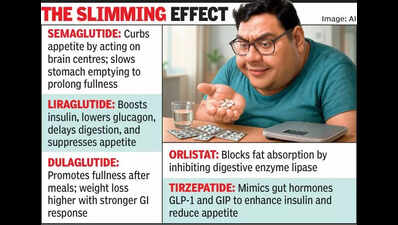Lifestyle
Gujarat Embraces Weight-Loss Drugs as Sales Surge to ₹61.2 Crore

In a striking development for the Indian pharmaceutical industry, sales of weight-loss medications, particularly the recently launched drug Tirzepatide, have reached ₹61.2 crore (approximately $7.4 million) in Gujarat within just six months of its introduction. This surge reflects a growing trend toward anti-obesity solutions as more individuals seek medical interventions for weight management. According to data from Pharmarack, the anti-obesity category has experienced a remarkable increase, with sales rising from ₹11.25 crore in September 2021 to the current figures in September 2025, marking a growth of over four times.
New Treatments Drive Market Growth
The introduction of advanced medications like Semaglutide in January 2022 and Tirzepatide in March 2025 has significantly altered the landscape of weight-loss treatments in India. Sheetal Sapale, Vice President of Commercial at Pharmarack, noted, “Anti-obesity drugs are gaining strong momentum across India, marking a major market shift. This is driven by a change in public health behavior wherein medical intervention for weight loss is increasingly becoming both acceptable and aspirational.”
While the rise in sales may not solely correlate with an increase in obesity cases, it highlights a willingness among the population to seek corrective measures. Medical professionals indicate that early signs of cardio-diabetic conditions are prompting longer treatment durations. Indian pharmaceutical companies such as DRL, Cipla, Sun Pharma, and Biocon are rapidly adapting to meet the rising demand. The affordability of these drugs, aided by local production, makes them more accessible to patients.
Patient Experiences and Medical Guidance
An illustrative case is that of Manish Upadhyay (name changed), a resident of Ahmedabad, who struggled with high HbA1c levels despite ongoing treatment. After his doctor prescribed Tirzepatide, he managed to lose nearly 10 kg in just two months. His treatment has been extended under medical supervision, showcasing the potential effectiveness of these medications.
Doctors in Gujarat have reported a noticeable uptick in patient inquiries and prescriptions for anti-obesity drugs, particularly in urban areas. Dr. Om Lakhani, an endocrinologist at Zydus Hospital, remarked, “There has been a definite rise in awareness about these medicines, and patients are now coming with specific requests to start the course.” He emphasized that prescriptions are typically reserved for individuals with a Body Mass Index (BMI) above 30 or between 27 and 30 if they have related health conditions such as diabetes or heart disease.
Dr. Lakhani mentioned that approximately two out of ten outpatient department patients now seek consultations specifically for weight loss, with many others addressing weight alongside metabolic issues. The demographic spans ages 18 to 60, predominantly focusing on individuals in their 30s and 40s who are particularly concerned about the economic aspects of treatment. He advised that while some patients may experience rapid weight loss, a recommended target is a steady reduction of 2–3 kg per month under medical supervision.
Despite the promising results, medical professionals express caution regarding a growing “quick fix” mentality that is often fueled by social media. Dr. Manoj Agrawal, a pediatric endocrinologist at Shalby Hospital, highlighted the risks associated with unsupervised use of weight-loss drugs. He stated, “If taken unsupervised, these drugs can lead to long-term issues such as osteoporosis and kidney damage due to nutritional loss.”
Dr. Agrawal stressed that effective weight management requires a collaborative approach involving doctors, dieticians, and patients to foster sustainable health outcomes. He also pointed out that the popularity of these medications is influenced by global trends and the portrayal of drugs like Ozempic (Semaglutide) and Mounjaro (Tirzepatide) as lifestyle enhancers.
The rapid growth of the anti-obesity drug market in Gujarat signifies a shift in how weight management is perceived, with increasing acceptance of medical treatments as viable solutions. As awareness grows, both the pharmaceutical industry and healthcare providers will need to navigate the balance between accessibility and the responsible use of these powerful medications.
-

 World4 months ago
World4 months agoSBI Announces QIP Floor Price at ₹811.05 Per Share
-

 Lifestyle4 months ago
Lifestyle4 months agoCept Unveils ₹3.1 Crore Urban Mobility Plan for Sustainable Growth
-

 Science3 months ago
Science3 months agoNew Blood Group Discovered in South Indian Woman at Rotary Centre
-

 Sports3 months ago
Sports3 months agoBroad Advocates for Bowling Change Ahead of Final Test Against India
-

 World4 months ago
World4 months agoTorrential Rains Cause Flash Flooding in New York and New Jersey
-

 Top Stories4 months ago
Top Stories4 months agoKonkani Cultural Organisation to Host Pearl Jubilee in Abu Dhabi
-

 Science4 months ago
Science4 months agoNothing Headphone 1 Review: A Bold Contender in Audio Design
-

 Top Stories4 months ago
Top Stories4 months agoAir India Crash Investigation Highlights Boeing Fuel Switch Concerns
-

 Sports3 months ago
Sports3 months agoCristian Totti Retires at 19: Pressure of Fame Takes Toll
-

 Business4 months ago
Business4 months agoIndian Stock Market Rebounds: Sensex and Nifty Rise After Four-Day Decline
-

 Politics3 months ago
Politics3 months agoAbandoned Doberman Finds New Home After Journey to Prague
-

 Top Stories4 months ago
Top Stories4 months agoPatna Bank Manager Abhishek Varun Found Dead in Well









